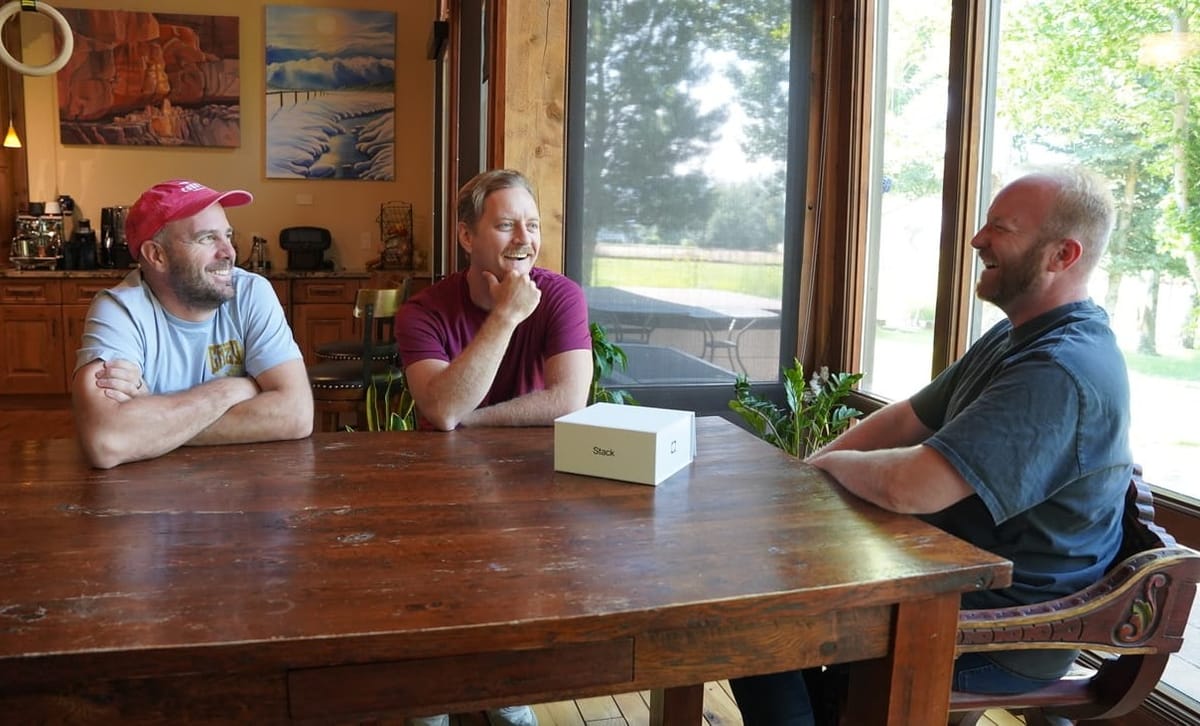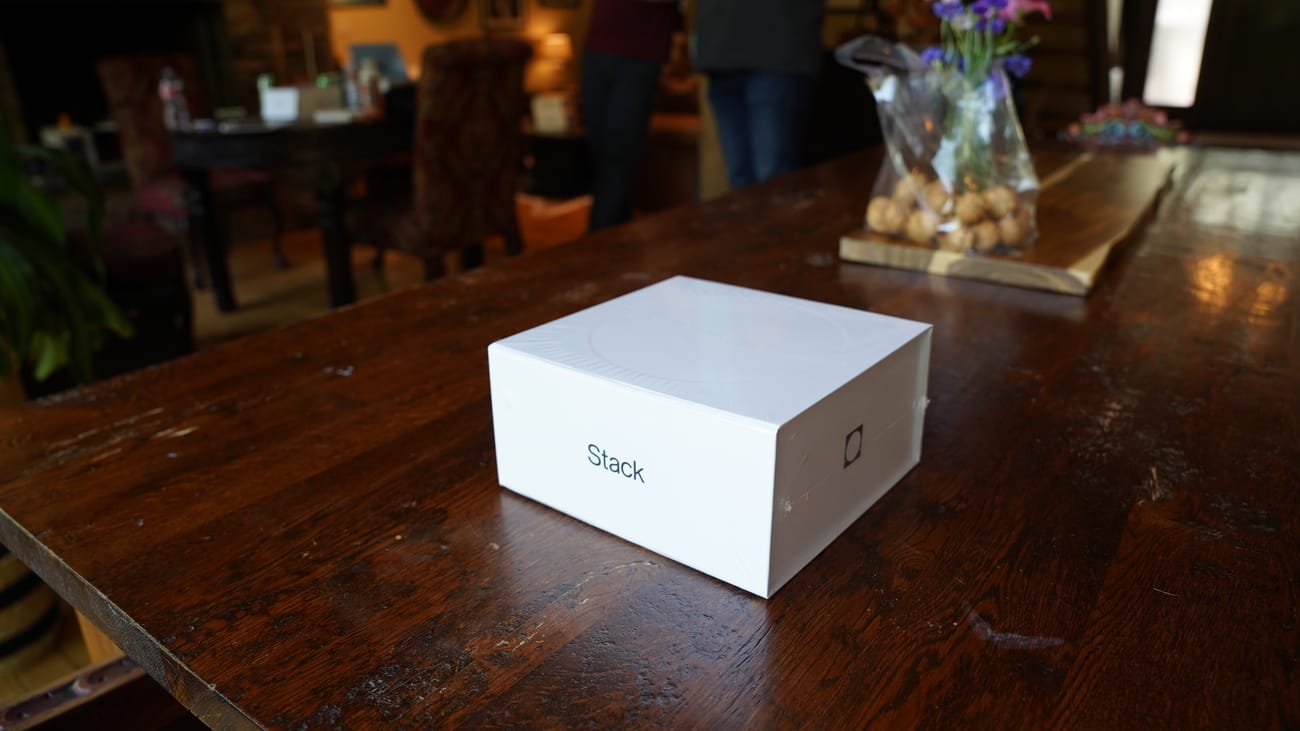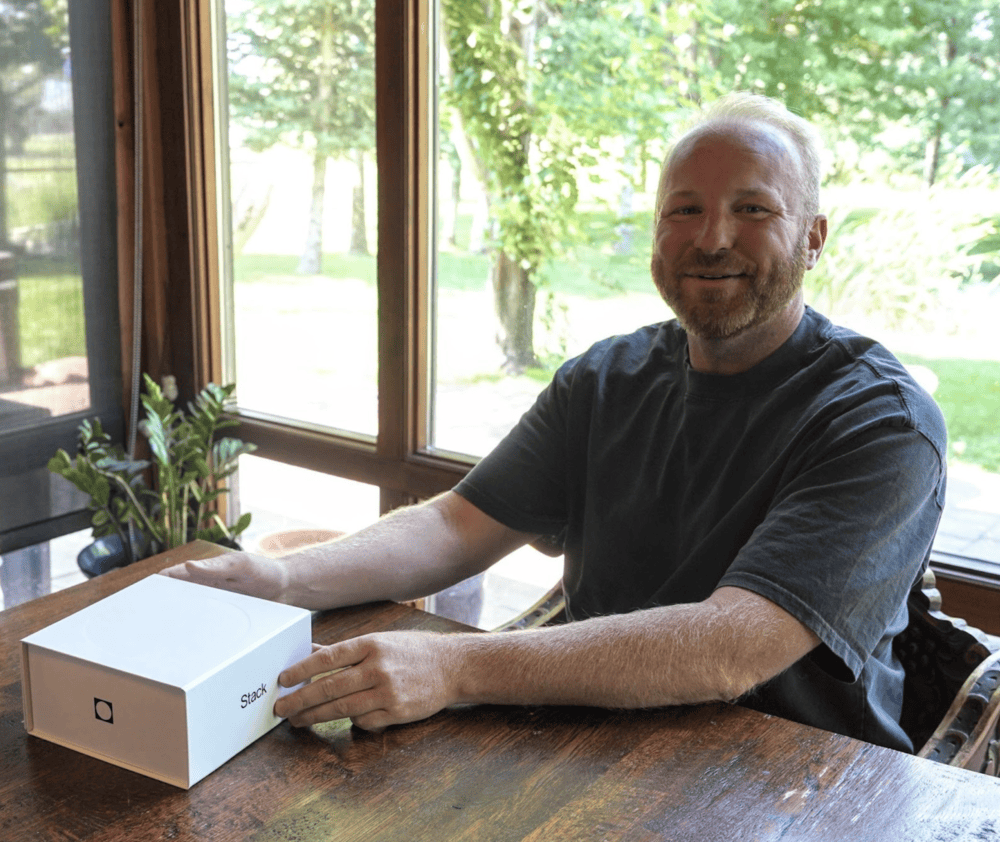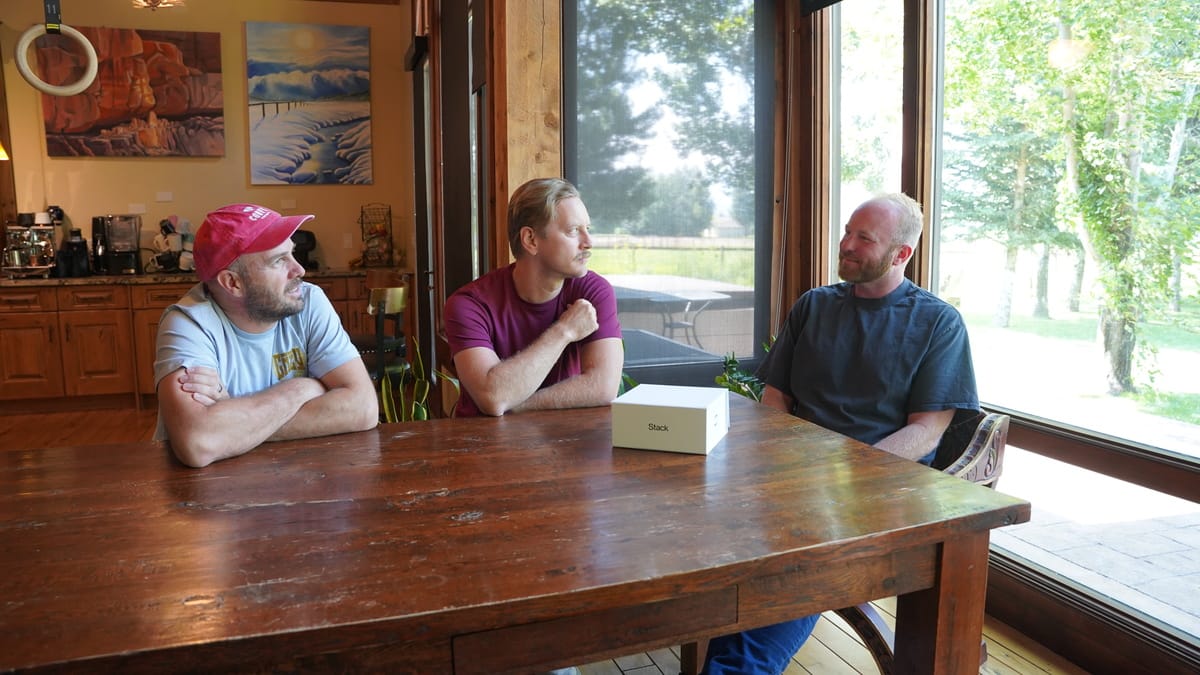

Midway, Utah - August 19, 2025
“Nothing matters if the brain isn’t there to make it matter.”
—Kirk Ouimet, Co-Founder of Phi
It’s a Monday morning in August. Utah serial founder Scott Paul sits in his upscale cabin-style home with cofounder Kirk Ouimet. The two have known each other for well over a decade, but today they’re discussing specific plans on growing their first venture together. They’re both longtime players in the Utah startup and investment scene. Ouimet’s first startup Scan (with another Utah icon Garrett Gee) sold to Snapchat for $50 million in 2014. Paul sold his own company ArmorActive the same year, with his next startup Instafluence selling to Disney/Maker Studios for an undisclosed amount the next year. They’ve both been investing and advising younger founders since, with numerous wins along the way.
Each has a track record most entrepreneurs can only admire, but their latest venture is more than a resume builder. Both Ouimet and Paul independently converged on a singular mission to forever change humanity, and their current startup–poised to ride the most powerful tech wave in human history–could make that happen within the decade.
Phi Health is (superficially) a nutritional supplement startup. Their first product, called “Stack,” is a monthly subscription to address a user’s baseline micronutrient needs. Each shipment provides two small daily tubes—day and night—each packed with about 2,000 micropills. The tiny spheres have a plant based time-release coating so the body absorbs each nutrient at the ideal stage of digestion. They look like nearly-microscopic jawbreaker candy, and even have a mild sweet flavor. Each tube is about the size of a lip balm applicator and replaces what would otherwise be two dozen separate pills and a countertop full of bottles.

“Supplementation is the easiest thing you can do for your health,” says Ouimet. “Like, try to go to bed on time? That's hard. Try to exercise every day? That's hard. Try to eat perfectly? That's the hardest.
“But brush your teeth and take these pills? We can all do that.”
It may seem an oddly simple business for two founders historically on the bleeding edge of tech. “Supplements” as we know them today have been popular since the 1970s. But Ouimet says Phi isn’t jumping into a stale industry so much as it’s launching a whole new category.
“Our goal isn’t to sell beetroot powder. Our goal is to solve the problem of health.”
A Personal Mission
Phi’s mission is to increase “healthspan,” or the duration a person can live with full health, in mind and body, doing as they please regardless of age. The issue became personal for Ouimet during college when he saw his future mother in law decline into Alzheimer’s disease.
“We weren’t even married yet. I was… like, 26. Do you remember what it was like to be very young and feel like you could do and conquer anything? If there’s any problem, you’ll be able to figure it out and solve it. When we found out [my then girlfriend, now wife’s mother] had early onset Alzheimer’s, it messed me up.”
He began researching Alzheimer’s, but had to accept the reality that the data and insight needed for a cure was (at best) hopelessly buried in esoteric conflicting medical journals, or it simply didn’t exist at all.
“I was like, ‘Oh, there’s no way that I’m going to be able to solve this.’”
Ouimet isn’t alone in his passion to solve the problem of health. Scott Paul has been keenly interested in longevity as well. During Utah Tech Week last year, Paul hosted longevity icon and BYU alum Bryan Johnson. Johnson (a Utah native) sold his fintech startup Braintree to PayPal for $800 million in 2013, and has since committed himself to the cause of radical longevity. His efforts have spawned multiple books, a YouTube channel with 1.7 million subscribers, a Netflix documentary, and his own “Blueprint” brand of health foods.
Like Ouimet, Paul had his own stark encounter with mortality. In January of this year Paul suffered a traumatic brain injury in a skiing accident, followed by a long, humbling, and ongoing recovery.
“I was doing something I’ve done a thousand times before. I decided to attempt a backflip. I had a helmet on, but the conditions weren’t great and I hadn’t done it in a while, so I didn’t have the muscle memory. I over-rotated and landed on my back/neck, slammed my head in the ground. They tried to Life Flight me, but the chopper couldn’t land, so they took me down on the toboggan. I went to the hospital in Murray and didn’t wake up for three days.”
The injury had lasting consequences. Paul estimates he lost ⅓ of his memories.“That was a reset for me. It cleared my cache.”
The Key
Years after his face to face encounter with Alzheimer’s, Ouimet found what felt like a missing key to unlock healthspan.

In 2020, Ouimet was on Twitter talking with the cofounder of an AI lab in San Francisco. They’d just developed a new language-based AI model. The team was very excited internally, even shocked at the model’s abilities. It was still in closed beta, but the cofounder sent Ouimet an API key to try it out.
“It was like meeting someone who had read every book, every forum post, every diary entry ever written,” Ouimet said. “I would ask it about philosophy, ethics, the nature of consciousness—and it always had something thoughtful to say. Sometimes profound, sometimes a little weird, but always… there.”
That research group was called OpenAI, the co-founder was Greg Brockman, and the AI at play was GPT-3. ChatGPT wouldn't publicly launch for another two years.
Ouimet quickly learned the model acted as a sort of “auto-complete” on steroids. He configured it for dialogue, then realized it responded differently based on the initial prompts. Instructions like “you’re a world expert in neurology” or “you only answer factually and correctly” would sway the AI toward those qualities. It could role-play any historical figure–any politician, any artist, any religious figure, anybody. Ouimet wondered who might be the smartest, most knowledgeable person he could speak with. He told the AI to role-play the God of the Bible, but responses were harsher than expected, with a heavy dose of Old Testament fire and brimstone. He tried to think of a figure that would provide wisdom without historical baggage.
What he came up with was a “Wise Being.”
“You are a Wise Being who has read all of humanity's content–books and everything–and you are now interacting with Kirk. Your goal is to help Kirk as much as possible. You are an expert in psychology, economics, physics, every branch of medicine, and countless other domains.”
The responses from this Wise Being left a lasting impression, and shaped Ouimet’s thinking on what later became Phi.
“I’d say something, and it would respond in a way that pushed my thinking further. It wasn’t just giving me answers—it was making me ask better questions,” he explained. “It made me realize we were entering a time when the smartest ‘person’ in the room might not even be human.”
“Wise Being was the most impressive thing I'd ever seen [Ouimet] pull off,” says Paul, “because he basically had a ChatGPT going before anybody else.”

The experience crystallized the duo’s belief that future breakthroughs—in health, longevity, really every domain of human potential—would come from collaboration between human curiosity and machine intelligence.
As a lifelong believer in nutritional supplements, and with AI as his sidekick, Ouimet experimented in creating his own vitamin pills at home. But after inhaling the equivalent of a yearly dose of Vitamin A over his kitchen table, Ouimet figured he might need some expert hands to go with the AI mind. He recruited a friend completing his PhD in pharmacology to research micronutrient supplementation and best practices. They found novel research on optimizing nutrient absorption and prototyped the micropills as a delivery mechanism.
Three years later, Stack is ready for the market.
The Future
Ouimet says it’s totally unique in the supplement space, delivering fundamental nutrients via the easiest, most effective means possible. They wanted to convey that depth of product expertise with the branding as well, which is aesthetically simple but conceptually intricate. Phi is a Greek letter representing the golden ratio, a pattern that shows up across nature from nautilus shells to spiral galaxies. The company name is a signal: the fundamental patterns of nature are here engineered to meet your needs. The first shipment includes a manual showing a bonsai tree on the cover, extending the metaphor: be your own bonsai artist (with help). Feed, prune, and shape a body, mind, and life that lasts.But the initial product is only a jumping-off point. Ouimet and Paul are both tech founders, after all. They deal in data, and it was that pivotal encounter with AI that started their journey.
When researching Alzheimer’s, Ouimet came face to face with the convoluted world of medical research and publishing. The reasons are myriad, but Ouimet sees a rising tide of skepticism and negative sentiment toward the legacy academic publishing system. For example, comparable nutrition studies will often refute each other’s outcomes without any clear cause. Meanwhile, shady interests can fund research, then publish only results while burying results that are no less valid, but would hurt the bottom. Regardless of good intentions, even the best scientists can find themselves beholden to the financial interests that fund their inquiry.
That’s why Phi aims to gather health insights from their own users via Apple Health Kit and similar services. Just as a tech company might A/B test a landing page, Phi could A/B test the results of, say, increasing the daily dose of Vitamin D3 during flu season. If you wear an Apple Watch, Oura Ring, FitBit or similar, you might be a prime candidate, and the results can be validated in ways a legacy lab could only dream of. A medium sized clinical trial at a university might have a few hundred participants, and a small study might only have a few dozen. Users often self-report their results in error and exaggeration. Only the largest studies include thousands of participants with truly statistically reliable results.
But for a company like Phi with tech in its DNA and thousands of users not far off, implementing a large-scale A/B test is as simple as a push notification. Users download the app, then opt-in to the studies they’re interested in, and continue taking the supplement stack they’re already subscribed to. Wearable devices then measure heart rate, blood oxygen levels, exertion, sleep quality, body temperature, and even a woman’s reproductive cycle. That mass of data can then be fed to AI models–the same models we’re seeing exponentially growing their analytical ability–and derive totally new, novel health insights. Phi aims to close the loop between rapidly accelerating AI cognition and real-world implementation to improve every user’s strength, athletic performance, mental clarity, longevity, and overall life satisfaction.
It’s a supplement company running like a software company, and that’s the point.
Ultimately users could have individualized blends based on specific genes, diet, and lifestyle needs. That could include far more than baseline nutrients. How about some Creatine to boost athletic performance and mental clarity? Or some Nicotinamide Adenine Dinucleotide (NAD) to super-charge your mitochondria? They could study and deploy any number of micronutrients, each validated by Phi’s own research.
It’s pretty ambitious for a supplement company. But if Ouimet and Paul have their way, you won’t be swallowing “vitamins” so much as feeding an intelligence loop—one that could make you sharper, stronger, and younger for longer. In the race against time, Phi’s betting on exponential artificial intelligence, statistical data… and a couple thousand tiny jawbreakers.
Learn more at phi.health.

